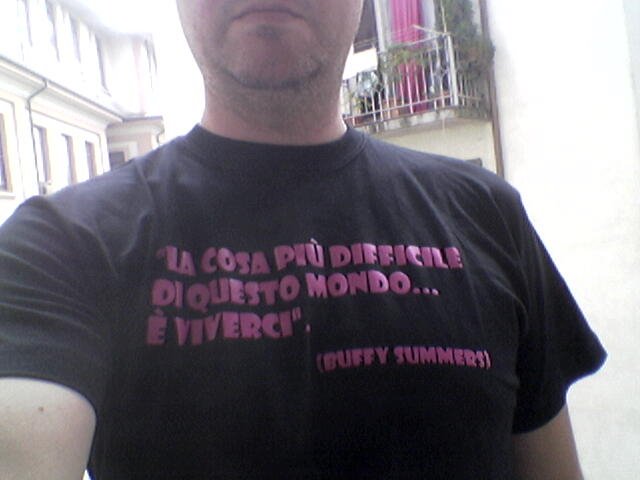Articolo di Andrea Scanzi su "Il Fatto Quotidiano"
A detta di uno dei diretti interessati, o forse per meglio dire delle vittime: "Sembra una versione soft porn di Scemo e Più Scemo". Parola di Larry Wilcox. Parlava di CHIPs, di cui è stato uno dei due protagonisti ("quello biondo") dal 1977 al 1983. Solo che Wilcox aveva interpretato la serie televisiva, mica il film. Che, evidentemente, gli ha fatto parecchio schifo. Prima di aggiustare un po' il tiro, concedendo alla nuova pellicola una parvenza di decenza, Wilcox ha pure aggiunto: "Ben fatto, Warner Bros! Hai giusto rovinato il brand di CHIPs e di Calif Highway Patrol. Bella mossa!".
Il film CHIPs, girato 34 anni dopo l'ultima puntata della serie, uscirà nelle sale italiane il 20 luglio. L'altro protagonista storico, Erik Estrada cioè Francis Poncharello detto "Ponch", è stato meno duro. Alla prima americana era presente e fa pure un piccolo cameo nel film. Estrada, che l'anno scorso è diventato davvero poliziotto (a 66 anni) per il Dipartimento di Polizia di St. Anthony in California, si è dimostrato assai conciliante. A lui l'idea del reboot cinematografico è piaciuta proprio: "Non stanno insultando nessuno: stanno solo proponendo la loro versione".
 Nell'attesa (non esattamente spasmodica) di vedere l'opera e con ciò capire se ha ragione il biondo o il moro, un fatto è certo: c'è una gran voglia di rimpiangere -e addirittura reinterpretare, che è poi in questo caso un riesumare - quel buco nero spesso tremendo che sono stati gli Anni Ottanta. Per carità, è stato un decennio con fiammate qua e là autentiche: nella musica, nel cinema, nella tivù. Solo che quasi sta esagerando. In primo luogo, quando ti riduci a fare il film su CHIPs quarant'anni dopo la prima puntata, certifichi implicitamente che la mancanza di idee nuove del cinema è pressoché accecante. L'esatto opposto delle serie tivù, che rispetto ai tempi di CHIPs hanno fatto passi da gigante. I passi di Lost, di Breaking Bad, di Sons of Anarchy, di True Detective. Eccetera. In seconda istanza, la proliferazione di operazioni-riesumazione legate agli Ottanta non coincide quasi mai con rese qualitative esaltanti. Dodici anni fa è uscito Hazzard. Ve lo ricordate? No? Beati voi. Il film era ispirato alla serie omonima più o meno coeva di CHIPs. Il risultato, per usare un eufemismo, non si rivelò esattamente esaltante. E difficilmente lo sarà il sequel di Magnum PI, altra serie mitica (va be') degli Ottanta. Ci stanno lavorando, uscirà a vent'anni dopo l'ultima puntata e la protagonista sarà la figlia di Thomas Sullivan Magnum IV (o se preferite "Magnum", interpretato da Tom Selleck).
Nell'attesa (non esattamente spasmodica) di vedere l'opera e con ciò capire se ha ragione il biondo o il moro, un fatto è certo: c'è una gran voglia di rimpiangere -e addirittura reinterpretare, che è poi in questo caso un riesumare - quel buco nero spesso tremendo che sono stati gli Anni Ottanta. Per carità, è stato un decennio con fiammate qua e là autentiche: nella musica, nel cinema, nella tivù. Solo che quasi sta esagerando. In primo luogo, quando ti riduci a fare il film su CHIPs quarant'anni dopo la prima puntata, certifichi implicitamente che la mancanza di idee nuove del cinema è pressoché accecante. L'esatto opposto delle serie tivù, che rispetto ai tempi di CHIPs hanno fatto passi da gigante. I passi di Lost, di Breaking Bad, di Sons of Anarchy, di True Detective. Eccetera. In seconda istanza, la proliferazione di operazioni-riesumazione legate agli Ottanta non coincide quasi mai con rese qualitative esaltanti. Dodici anni fa è uscito Hazzard. Ve lo ricordate? No? Beati voi. Il film era ispirato alla serie omonima più o meno coeva di CHIPs. Il risultato, per usare un eufemismo, non si rivelò esattamente esaltante. E difficilmente lo sarà il sequel di Magnum PI, altra serie mitica (va be') degli Ottanta. Ci stanno lavorando, uscirà a vent'anni dopo l'ultima puntata e la protagonista sarà la figlia di Thomas Sullivan Magnum IV (o se preferite "Magnum", interpretato da Tom Selleck).
 Perché ci mancano così tanto quegli anni? Forse perché eravamo giovani e forse belli, forse perché voltarsi indietro è un gesto che prima o poi viene voglia di fare. Anche solo per vedere l'effetto che fa. Un gesto umanissimo, ma artisticamente - e non solo artisticamente - scivolosissimo. C'è sempre il rischio di rovinare il ricordo, di scoprire quanto nel frattempo tutto sia cambiato: di quanto, per non farla cadere troppo dall'alto, il tempo abbia travolto ogni cosa. Pochi giorni fa si sono commossi in tanti nel vedere la foto di "Starsky" Paul Micheal Glaser che spingeva "Hutch" David Soul sulla sedia a rotelle. Anche gli "eroi" invecchiano, come ci aveva dimostrato inequivocabilmente pure Harrison Ford mostrandoci un Han Solo che, tutto sommato, nell'ultimo Guerre stellari non vedeva l'ora di farsi ammazzare (con quel figlio coglione, oltretutto). Più che rimpiangerli a casaccio, verrebbe solo voglia di lasciare gli Anni Ottanta dove stavano, in quel limbo posticcio tra consumismo frainteso e folgorazione disattesa. Quel poco di bello che c'è stato non può essere ripetuto.
Perché ci mancano così tanto quegli anni? Forse perché eravamo giovani e forse belli, forse perché voltarsi indietro è un gesto che prima o poi viene voglia di fare. Anche solo per vedere l'effetto che fa. Un gesto umanissimo, ma artisticamente - e non solo artisticamente - scivolosissimo. C'è sempre il rischio di rovinare il ricordo, di scoprire quanto nel frattempo tutto sia cambiato: di quanto, per non farla cadere troppo dall'alto, il tempo abbia travolto ogni cosa. Pochi giorni fa si sono commossi in tanti nel vedere la foto di "Starsky" Paul Micheal Glaser che spingeva "Hutch" David Soul sulla sedia a rotelle. Anche gli "eroi" invecchiano, come ci aveva dimostrato inequivocabilmente pure Harrison Ford mostrandoci un Han Solo che, tutto sommato, nell'ultimo Guerre stellari non vedeva l'ora di farsi ammazzare (con quel figlio coglione, oltretutto). Più che rimpiangerli a casaccio, verrebbe solo voglia di lasciare gli Anni Ottanta dove stavano, in quel limbo posticcio tra consumismo frainteso e folgorazione disattesa. Quel poco di bello che c'è stato non può essere ripetuto.
Se n'è accorto perfino Michael Mann, che pure è un genio, quando ha provato a portare al cinema la serie televisiva Miami Vice (di cui era produttore esecutivo): il film, nonostante cast ed effetti speciali, fu una delusione. Meglio poi non parlare dell'obbrobrio che è stato il remake di Point Break, gioiello di inizio Novanta con un Patrick Swayze leggendario: perché replicare un'epifania non replicabile? Non ha senso, non è giusto. Per certi versi è persino sacrilego.
In questa mania tracimante di revival è rimasto invischiato addirittura David Lynch. Ha deciso di riprendere Twin Peaks, quella sì una serie straordinaria, ventisette anni dopo. Ci sono ancora molti attori "originali": di fatto, più che un sequel, ¡proprio la terza stagione che in tanti avrebbero voluto vedere. Solo che nel frattempo è passato un quarto di secolo. Un rischio, un azzardo, una follia. Soltanto Lynch può riuscirci: se fallisce pure lui, per favore, chiudete per sempre il sarcofago di quegli anni.
 Nell'attesa (non esattamente spasmodica) di vedere l'opera e con ciò capire se ha ragione il biondo o il moro, un fatto è certo: c'è una gran voglia di rimpiangere -e addirittura reinterpretare, che è poi in questo caso un riesumare - quel buco nero spesso tremendo che sono stati gli Anni Ottanta. Per carità, è stato un decennio con fiammate qua e là autentiche: nella musica, nel cinema, nella tivù. Solo che quasi sta esagerando. In primo luogo, quando ti riduci a fare il film su CHIPs quarant'anni dopo la prima puntata, certifichi implicitamente che la mancanza di idee nuove del cinema è pressoché accecante. L'esatto opposto delle serie tivù, che rispetto ai tempi di CHIPs hanno fatto passi da gigante. I passi di Lost, di Breaking Bad, di Sons of Anarchy, di True Detective. Eccetera. In seconda istanza, la proliferazione di operazioni-riesumazione legate agli Ottanta non coincide quasi mai con rese qualitative esaltanti. Dodici anni fa è uscito Hazzard. Ve lo ricordate? No? Beati voi. Il film era ispirato alla serie omonima più o meno coeva di CHIPs. Il risultato, per usare un eufemismo, non si rivelò esattamente esaltante. E difficilmente lo sarà il sequel di Magnum PI, altra serie mitica (va be') degli Ottanta. Ci stanno lavorando, uscirà a vent'anni dopo l'ultima puntata e la protagonista sarà la figlia di Thomas Sullivan Magnum IV (o se preferite "Magnum", interpretato da Tom Selleck).
Nell'attesa (non esattamente spasmodica) di vedere l'opera e con ciò capire se ha ragione il biondo o il moro, un fatto è certo: c'è una gran voglia di rimpiangere -e addirittura reinterpretare, che è poi in questo caso un riesumare - quel buco nero spesso tremendo che sono stati gli Anni Ottanta. Per carità, è stato un decennio con fiammate qua e là autentiche: nella musica, nel cinema, nella tivù. Solo che quasi sta esagerando. In primo luogo, quando ti riduci a fare il film su CHIPs quarant'anni dopo la prima puntata, certifichi implicitamente che la mancanza di idee nuove del cinema è pressoché accecante. L'esatto opposto delle serie tivù, che rispetto ai tempi di CHIPs hanno fatto passi da gigante. I passi di Lost, di Breaking Bad, di Sons of Anarchy, di True Detective. Eccetera. In seconda istanza, la proliferazione di operazioni-riesumazione legate agli Ottanta non coincide quasi mai con rese qualitative esaltanti. Dodici anni fa è uscito Hazzard. Ve lo ricordate? No? Beati voi. Il film era ispirato alla serie omonima più o meno coeva di CHIPs. Il risultato, per usare un eufemismo, non si rivelò esattamente esaltante. E difficilmente lo sarà il sequel di Magnum PI, altra serie mitica (va be') degli Ottanta. Ci stanno lavorando, uscirà a vent'anni dopo l'ultima puntata e la protagonista sarà la figlia di Thomas Sullivan Magnum IV (o se preferite "Magnum", interpretato da Tom Selleck). Perché ci mancano così tanto quegli anni? Forse perché eravamo giovani e forse belli, forse perché voltarsi indietro è un gesto che prima o poi viene voglia di fare. Anche solo per vedere l'effetto che fa. Un gesto umanissimo, ma artisticamente - e non solo artisticamente - scivolosissimo. C'è sempre il rischio di rovinare il ricordo, di scoprire quanto nel frattempo tutto sia cambiato: di quanto, per non farla cadere troppo dall'alto, il tempo abbia travolto ogni cosa. Pochi giorni fa si sono commossi in tanti nel vedere la foto di "Starsky" Paul Micheal Glaser che spingeva "Hutch" David Soul sulla sedia a rotelle. Anche gli "eroi" invecchiano, come ci aveva dimostrato inequivocabilmente pure Harrison Ford mostrandoci un Han Solo che, tutto sommato, nell'ultimo Guerre stellari non vedeva l'ora di farsi ammazzare (con quel figlio coglione, oltretutto). Più che rimpiangerli a casaccio, verrebbe solo voglia di lasciare gli Anni Ottanta dove stavano, in quel limbo posticcio tra consumismo frainteso e folgorazione disattesa. Quel poco di bello che c'è stato non può essere ripetuto.
Perché ci mancano così tanto quegli anni? Forse perché eravamo giovani e forse belli, forse perché voltarsi indietro è un gesto che prima o poi viene voglia di fare. Anche solo per vedere l'effetto che fa. Un gesto umanissimo, ma artisticamente - e non solo artisticamente - scivolosissimo. C'è sempre il rischio di rovinare il ricordo, di scoprire quanto nel frattempo tutto sia cambiato: di quanto, per non farla cadere troppo dall'alto, il tempo abbia travolto ogni cosa. Pochi giorni fa si sono commossi in tanti nel vedere la foto di "Starsky" Paul Micheal Glaser che spingeva "Hutch" David Soul sulla sedia a rotelle. Anche gli "eroi" invecchiano, come ci aveva dimostrato inequivocabilmente pure Harrison Ford mostrandoci un Han Solo che, tutto sommato, nell'ultimo Guerre stellari non vedeva l'ora di farsi ammazzare (con quel figlio coglione, oltretutto). Più che rimpiangerli a casaccio, verrebbe solo voglia di lasciare gli Anni Ottanta dove stavano, in quel limbo posticcio tra consumismo frainteso e folgorazione disattesa. Quel poco di bello che c'è stato non può essere ripetuto.Se n'è accorto perfino Michael Mann, che pure è un genio, quando ha provato a portare al cinema la serie televisiva Miami Vice (di cui era produttore esecutivo): il film, nonostante cast ed effetti speciali, fu una delusione. Meglio poi non parlare dell'obbrobrio che è stato il remake di Point Break, gioiello di inizio Novanta con un Patrick Swayze leggendario: perché replicare un'epifania non replicabile? Non ha senso, non è giusto. Per certi versi è persino sacrilego.
In questa mania tracimante di revival è rimasto invischiato addirittura David Lynch. Ha deciso di riprendere Twin Peaks, quella sì una serie straordinaria, ventisette anni dopo. Ci sono ancora molti attori "originali": di fatto, più che un sequel, ¡proprio la terza stagione che in tanti avrebbero voluto vedere. Solo che nel frattempo è passato un quarto di secolo. Un rischio, un azzardo, una follia. Soltanto Lynch può riuscirci: se fallisce pure lui, per favore, chiudete per sempre il sarcofago di quegli anni.










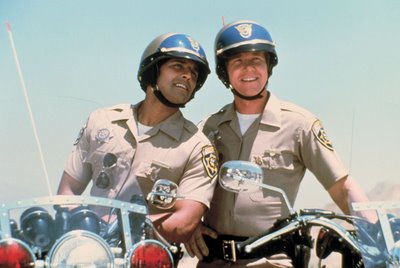
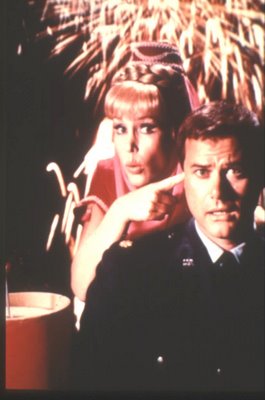

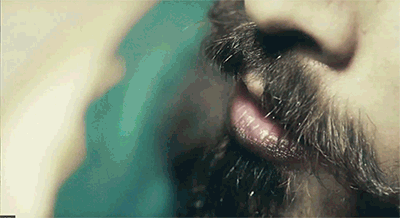








+1.jpg)




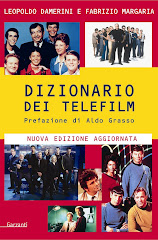.jpg)









